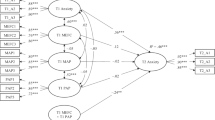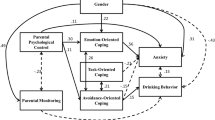Abstract
Parental organismic trust facilitates an autonomy-supportive parenting style whereas parental anxiety hinders it. However, few studies have explored the relationship among organismic trust, parental anxiety, and protective situational factors. Therefore, the present study aimed to examine the main effect of organismic trust on parental anxiety and the moderating effect of adolescents’ coping styles on the relationship between organismic trust and parental anxiety. Based on Trait Activation Theory, it was hypothesized that the effect of organismic trust on parental anxiety was dependent on contextual cues. This study adopted a quasi-experimental between-subject design to manipulate the moderator with four conditions (adolescents’ coping styles: task-oriented coping, emotion-oriented coping, avoidance-oriented coping, and no coping). A total of 284 participants with at least one school child aged 12 ~ 18 were recruited for this study. Results of hierarchical linear regression revealed that the negative relationship between organismic trust and parental anxiety was stronger when parents perceived adolescents’ using task-oriented coping than emotion-oriented and avoidance-oriented coping. This study suggested that the programs aimed at adolescents and parents that combine adolescents’ task-oriented coping with the enhancement of parental organismic trust may be more effective in alleviating parental anxiety.

Similar content being viewed by others
Data availability
The datasets generated during and/or analyzed during the current study are available from the corresponding author upon reasonable request.
References
Adler, N. E., Epel, E. S., Castellazzo, G., & Ickovics, J. (2000). Relationship of subjective and objective social status with psychological and physiological functioning: Preliminary data in healthy white women. Health Psychology, 19(6), 586–592. https://doi.org/10.1037/0278-6133.19.6.586
Akgül, G., & Atalan Ergin, D. (2021). Adolescents’ and parents’ anxiety during COVID-19: Is there a role of cyberchondriasis and emotion regulation through the internet? Current Psychology, 40(10), 4750–4759. https://doi.org/10.1007/s12144-020-01229-7
Ardenghi, S., Russo, S., Bani, M., Rampoldi, G., & Strepparava, M. G. (2023). Supporting students with empathy: The association between empathy and coping strategies in pre-clinical medical students. Current Psychology. Advance online publication. https://doi.org/10.1007/s12144-023-04397-4
Balkıs, M., & Duru, E. (2018). The protective role of rational beliefs on the relationship between irrational beliefs, emotional states of stress, depression and anxiety. Journal of Rational-Emotive & Cognitive-Behavior Therapy, 37(1), 96–112. https://doi.org/10.1007/s10942-018-0305-7
Chen, G., Oubibi, M., Liang, A., & Zhou, Y. (2022). Parents’ educational anxiety under the “Double Reduction” policy based on the family and students’ personal factors. Psychology Research and Behavior Management, 15, 2067–2082. https://doi.org/10.2147/PRBM.S370339
David, D., Lynn, S. J., & Ellis, A. (2010). The role of rational and irrational beliefs in human functioning and disturbances: Implications for research, theory, and clinical practice. Oxford University Press.
de Clercq, D., Haq, I. U., & Azeem, M. U. (2018). The roles of informational unfairness and political climate in the relationship between dispositional envy and job performance in Pakistani organizations. Journal of Business Research, 82, 117–126. https://doi.org/10.1016/j.jbusres.2017.09.006
Dix, T. (1991). The affective organization of parenting: Adaptive and maladaptative processes. Psychological Bulletin, 110(1), 3–25. https://doi.org/10.1037/0033-2909.110.1.3
Dix, T., Gershoff, E. T., Meunier, L. N., & Miller, P. C. (2004). The affective structure of supportive parenting: Depressive symptoms, immediate emotions, and child-oriented motivation. Developmental Psychology, 40, 1212–1227. https://doi.org/10.1037/0012-1649.40.6.1212
Duru, E., & Balkıs, M. (2022). Childhood trauma, depressive symptoms and rational/irrational beliefs: A moderated mediation model. Current Psychology, 41, 7258–7270. https://doi.org/10.1007/s12144-020-01282-2
Dweck, C. S. (2008). Can personality be changed? The role of beliefs in personality and change. Current Directions in Psychological Science, 17(6), 391–394. https://doi.org/10.1111/j.1467-8721.2008.00612.x
Ellis, A. (1962). Reason and emotion in psychotherapy. Lyle Stuart.
Endler, N. S., & Parker, J. D. (1990). Multidimensional assessment of coping: A critical evaluation. Journal of Personality and Social Psychology, 58(5), 844–854. https://doi.org/10.1037/0022-3514.58.5.844
Faul, F., Erdfelder, E., Lang, A. G., & Buchner, A. (2007). G*Power 3: A flexible statistical power analysis program for the social, behavioral, and biomedical sciences. Behavior Research Methods, 39(2), 175–191. https://doi.org/10.3758/BF03193146
Ginsburg, G. S., & Schlossberg, M. C. (2002). Family-based treatment of childhood anxiety disorders. International Review of Psychiatry, 14(2), 143–154. https://doi.org/10.1080/09540260220132662
Griffith, M. A., Dubow, E. F., & Ippolito, M. F. (2000). Developmental and cross-situational differences in adolescents’ coping strategies. Journal of Youth and Adolescence, 29(2), 183–204. https://doi.org/10.1023/A:1005104632102
Hayes, A. F. (2013). An introduction to mediation, moderation, and conditional process analysis: A regression-based approach. Guilford Press.
Inguglia, C., Costa, S., Ingoglia, S., Cuzzocrea, F., & Liga, F. (2022). The role of parental control and coping strategies on adolescents’ problem behaviors. Current Psychology, 41, 1287–1300. https://doi.org/10.1007/s12144-020-00648-w
Jiang, T., & Sedikides, C. (2022). Awe motivates authentic-self pursuit via self-transcendence: Implications for prosociality. Journal of Personality and Social Psychology, 123(3), 576–596. https://doi.org/10.1037/pspi0000381
Joussemet, M., Koestner, R., Lekes, N., & Landry, R. (2005). A longitudinal study of the relationship of maternal autonomy support to children’s adjustment and achievement in school. Journal of Personality, 73(5), 1215–1236. https://doi.org/10.1111/j.1467-6494.2005.00347.x
Joussemet, M., Landry, R., & Koestner, R. (2008). A self-determination theory perspective on parenting. Canadian Psychology/ Psychologie Canadienne, 49(3), 194–200. https://doi.org/10.1037/a0012754
Landry, R., Whipple, N., Mageau, G., Joussemet, M., Koestner, R., DiDio, L., Gingras, I., Bernier, A., & Haga, S. M. (2008). Trust in organismic development, autonomy support, and adaptation among mothers and their children. Motivation and Emotion, 32(3), 173–188. https://doi.org/10.1007/s11031-008-9092-2
Lazarus, R. S. (1999). Stress and emotion: A new synthesis. Springer Publishing Company.
Lazarus, R. S., & Folkman, S. (1984). Stress, appraisal, and coping. Springer Publishing Company.
Li, M., Zhao, T., Huang, E., & Li, J. (2020). How does a public health emergency motivate people’s impulsive consumption? An empirical study during the COVID-19 outbreak in China. International Journal of Environmental Research and Public Health, 17(14), Article 5019. https://doi.org/10.3390/ijerph17145019
Lucas, T., Drolet, C. E., Strelan, P., Karremans, J. C., & Sutton, R. M. (2022). Fairness and forgiveness: Effects of priming justice depend on justice beliefs. Current Psychology, 41, 6336–6347. https://doi.org/10.1007/s12144-020-01101-8
MacCann, C., Fogarty, G. J., Zeidner, M., & Roberts, R. D. (2011). Coping mediates the relationship between emotional intelligence (EI) and academic achievement. Contemporary Educational Psychology, 36(1), 60–70. https://doi.org/10.1016/j.cedpsych.2010.11.002
MacCann, C., Lipnevich, A. A., Burrus, J., & Roberts, R. D. (2012). The best years of our lives? Coping with stress predicts school grades, life satisfaction, and feelings about high school. Learning and Individual Differences, 22(2), 235–241. https://doi.org/10.1016/j.lindif.2011.08.004
Mirowsky, J., & Ross, C. E. (2000). Socioeconomic status and subjective life expectancy. Social Psychology Quarterly, 63(2), 133–151. https://doi.org/10.2307/2695888
Parenteau, A. M., Alen, N. V., Deer, L. K., Nissen, A. T., Luck, A. T., & Hostinar, C. E. (2020). Parenting matters: Parents can reduce or amplify children’s anxiety and cortisol responses to acute stress. Development and Psychopathology, 32(5), 1799–1809. https://doi.org/10.1017/S0954579420001285
Parker, J. D. A., & Endler, N. S. (1996). Coping and defense: A historical overview. In M. Zeidner & N. Endler (Eds.), Handbook of coping: Theory, research, applications (pp. 3–23). Wiley.
Ryan, R. M., & Deci, E. L. (2017). Self-determination theory: Basic psychological needs in motivation, development, and wellness. Guilford Publishing.
Schäfer, A., Pels, F., & Kleinert, J. (2020). Effects of different coping strategies on the psychological and physiological stress reaction: An experimental study. European Journal of Health Psychology, 27(3), 109–123. https://doi.org/10.1027/2512-8442/a000056
Serafini, G., Adavastro, G., Canepa, G., De Berardis, D., Valchera, A., Pompili, M., Nasrallah, H., & Amore, M. (2018). The Efficacy of Buprenorphine in Major Depression, Treatment-Resistant Depression and Suicidal Behavior: A Systematic Review. International Journal of Molecular Sciences, 19(8), Article 2410. https://doi.org/10.3390/ijms19082410
Serafini, G., Parisi, V. M., Aguglia, A., Amerio, A., Sampogna, G., Fiorillo, A., Pompili, M., & Amore, M. (2020). A specific inflammatory profile underlying suicide risk? Systematic review of the main literature findings. International Journal of Environmental Research and Public Health, 17(7), Article 2393. https://doi.org/10.3390/ijerph17072393
Skinner, E. A., & Saxton, E. A. (2019). The development of academic coping in children and youth: A comprehensive review and critique. Developmental Review, 53, Article 100870. https://doi.org/10.1016/j.dr.2019.100870
Spielberger, C. D. (1972). Anxiety: Current trends in theory and research. Academic Press.
Spielberger, C. D., Gorsuch, R. L., & Lushene, R. E. (1970). Manual for the State-Trait Anxiety Inventory. Consulting Psychologists Press.
Tett, R. P., & Burnett, D. D. (2003). A personality trait-based interactionist model of job performance. Journal of Applied Psychology, 88(3), 500–517. https://doi.org/10.1037/0021-9010.88.3.500
Tett, R. P., Simonet, D. V., Walser, B., & Brown, C. (2014). Trait Activation Theory. In N. Christiansen & R. P. Tett (Ed.), Handbook of Personality at Work (pp. 71–100). Routledge. https://doi.org/10.4324/9780203526910.ch5
Wang, F., Wang, M., Wang, X., & Zhao, J. (2022). Child-and family-level factors as predictors of Chinese children’s generalized anxiety disorder symptoms in middle childhood. Current Psychology. Advance online publication. https://doi.org/10.1007/s12144-022-03583-0
Weiner, B. (2005). Motivation from an attribution perspective and the social psychology of perceived competence. In A. J. Elliot & C. S. Dweck (Eds.), Handbook of competence and motivation (pp. 73–84). Guilford.
Woodruff-Borden, J., Morrow, C., Bourland, S., & Cambron, S. (2002). The behavior of anxious parents: Examining mechanisms of transmission of anxiety from parent to child. Journal of Clinical Child and Adolescent Psychology, 31(3), 364–374. https://doi.org/10.1207/S15374424JCCP3103_08
Wu, K., Wang, F., Wang, W., & Li, Y. (2021). Parents' education anxiety and children's academic burnout: The role of parental burnout and family function. Frontiers in Psychology, 12, Article 764824. https://doi.org/10.3389/fpsyg.2021.764824
Zeidner, M., & Saklofske, D. (1996). Adaptive and maladaptive coping. In M. Zeidner & N. Endler (Eds.), Handbook of coping: Theory, research, applications (pp. 505–531). Wiley.
Acknowledgements
The authors thank the participants who took part in the study, and the lab members who offered invaluable feedback.
Funding
This work was supported by the fellowship of the China Postdoctoral Science Foundation (Grant No. 2021M703467) and the Special Research Assistant Program of the Chinese Academy of Sciences (Grant No. E2CX0114).
Author information
Authors and Affiliations
Contributions
Xiaojun Pan contributed to the Conceptualization, Methodology, Investigation, Data Curation, and Writing-Original Draft. Yuan Fang contributed to the Conceptualization, Methodology, Writing-Review & Editing. Yutong Wu contributed to the Conceptualization, Writing-Review & Editing. Zhiyan Chen contributed to the Conceptualization, Methodology, Writing-Review & Editing, and Supervision. All authors have read and approved the final manuscript.
Corresponding author
Ethics declarations
Ethics declarations
All procedures performed in studies involving human participants were in accordance with the ethical standards of the institutional research committee at the Institute of Psychology, Chinese Academy of Sciences.
Consent to participate
All participants provided their informed consent before participating in this study.
Consent to publish
All participants consented to the results of the study being published in a scientific publication.
Conflicts of interest
The authors declared no potential conflicts of interest with respect to the research, authorship, and/or publication of this article.
Additional information
Publisher's note
Springer Nature remains neutral with regard to jurisdictional claims in published maps and institutional affiliations.
Supplementary Information
Below is the link to the electronic supplementary material.
Rights and permissions
Springer Nature or its licensor (e.g. a society or other partner) holds exclusive rights to this article under a publishing agreement with the author(s) or other rightsholder(s); author self-archiving of the accepted manuscript version of this article is solely governed by the terms of such publishing agreement and applicable law.
About this article
Cite this article
Pan, X., Fang, Y., Wu, Y. et al. The effect of parental organismic trust on parental anxiety: The moderating role of perceived adolescents’ coping styles. Curr Psychol 43, 7785–7793 (2024). https://doi.org/10.1007/s12144-023-04879-5
Accepted:
Published:
Issue Date:
DOI: https://doi.org/10.1007/s12144-023-04879-5




